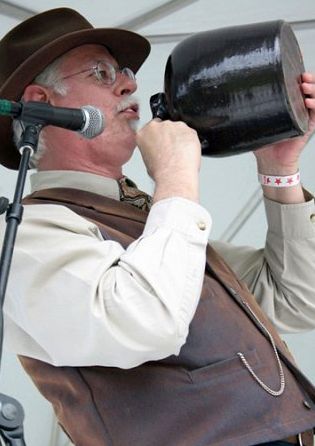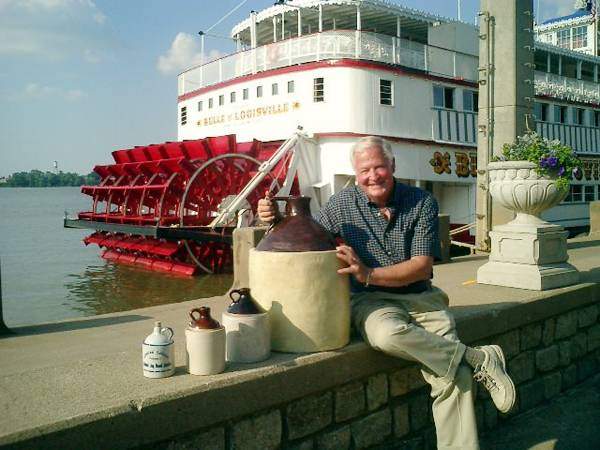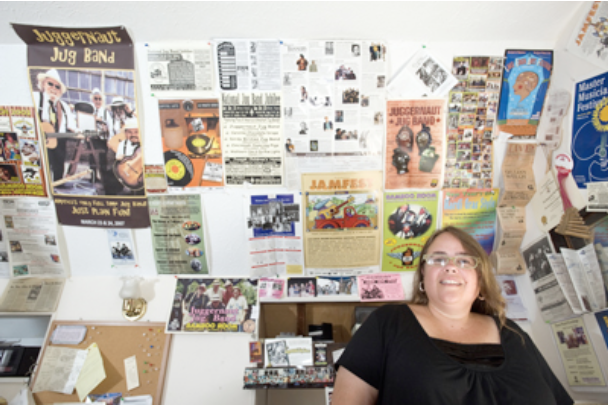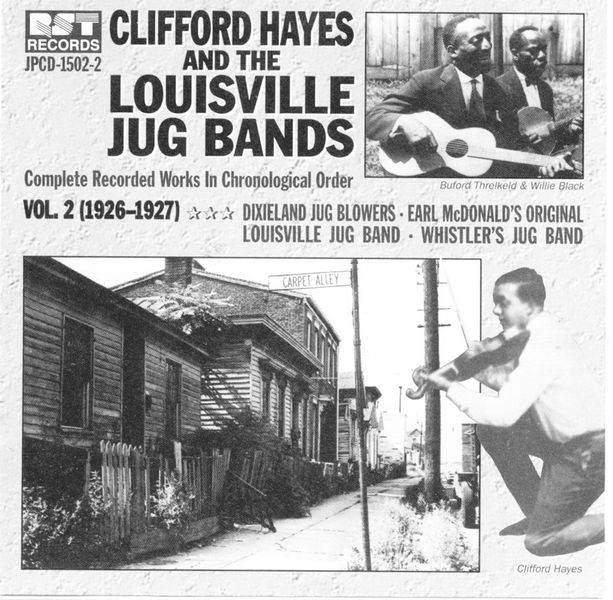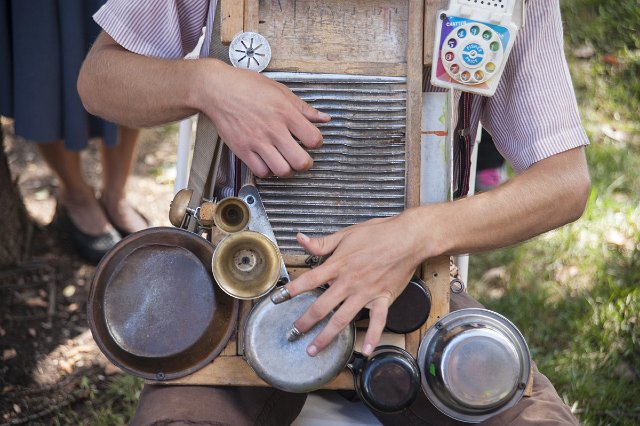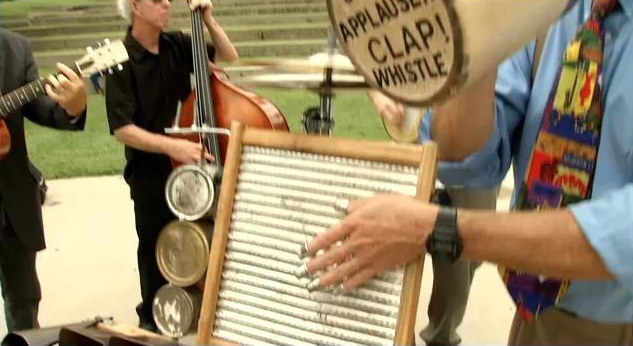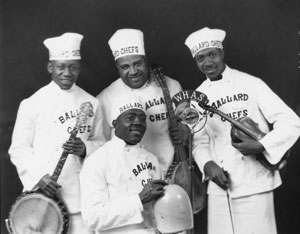Between the 1890s and the Great Depression, jug band music enjoyed immense popularity along the Ohio and Mississippi River cities. What you may not know is that many believe* this infectious music originated in Louisville, which also produced some of the greatest of the jug bands. Fred Cox, an attorney from Indianapolis, researched the history of the music for a book, but died before its publication*. It was eventually published, in 1994, by Laurie Wright of Chigwell, England. Mr. Wright has been advised of recent efforts to revive Louisville’s jug band tradition through the National Jug Band Jubilee, and has offered that all-volunteer enterprise his best wishes.
At the turn of the century, African-American musicians in Louisville walked the streets playing tunes on “found” or homemade instruments like empty liquor jugs (“the poor man’s tuba”), kazoos and washboards. They started a craze, “jug music,” which swept up and down the Ohio and Mississippi rivers, infiltrating black music in the major river cities. Before the sound peaked in the early 1930s, Louisville artists like Clifford Hayes (“Atlantic Stomp”), Earl McDonald’s Original Louisville Jug Band (“She’s In The Graveyard Now”) and Sarah Martin (“Sugar Blues”) recorded many tunes, both together and separately, some of which became quite popular.
In “The History of the Blues,” Francis Davis writes that “like the rural fife-and drum bands of which we have regrettably few recorded examples, jug bands can be heard as a missing link between the blues and the music of West Africa … Along with the washboard bands in which a simple laundry device was transformed into a percussion instrument, the jug bands were a tribute to the ingenuity shown by impoverished African Americans* in expressing themselves musically on whatever they found at hand. For that matter, (Gus) Cannon (leader of Cannon’s Jug Stompers) fashioned his first banjo out a bread pan and a broom handle. And there are obvious parallels to be drawn between the use of such homemade or ‘nonmusical’ instruments then and similar practices in hip hop, most notably ‘scratching.’”
Jug music was a descendant of the minstrel and early ragtime traditions, and in some cases touched by the jazz that was developing in New Orleans and Chicago, and as it traveled down the Ohio and Mississippi rivers, Memphis also became the center for a distinctive jug band style. Much of the history of early jug music slipped from sight, however, until the folk revival of the late ’60s. Then, groups like Jim Kweskin & His Jug Band, the Grateful Dead — who recorded a version of Cannon’s “Minglewood Blues” — and the Rooftop Singers began to perform songs by Hayes and other jug musicians.
In the early 1970s, Fred Cox, an Indianapolis attorney, compiled a manuscript called “The Jug Bands of Louisville.” Cox died in 1978 before it could be published. However, in 1993, several chapters were printed in Storyville, a British blues magazine, and it was published in its entirety a year later.
During the 1950s and’60s, Cox — with the help of two other researchers, John Randolph and John Harris — interviewed many of the original jug musicians and apparently felt he had traced* the origins of jug music to two Louisville musicians, B.D. Tite and a rambler known only as Black Daddy.
According to Cox, Tite played banjo in a band popular local group, the Tite Brothers String Band, until a depression struck the country in the 1890s and made jobs for musicians scarce. In the summer of 1898, Tite partnered with Black Daddy and the two roamed the country looking for work. They ended up in southwestern Virginia, where they hooked up with a fiddler named Cy Anderson, who was looking for banjo players. The two musicians spent the summer with Anderson and his brother Charley, also a musician. The men were jamming one day when a neighbor came over with an empty jug.
“The Andersons nodded to him as he sat on the edge of the porch and began to lay down a simple bass line behind the music blowing on his jug,” Cox wrote. “B.D. stopped playing, sat near the jug blower, watching and listening, fascinated by the sounds he was hearing for the first time. When the band finished the tune, B.D. was all questions, but the old man could only say, ‘I just picked it up and started blowing.’ The advice he would offer was simple enough: ‘Look around for the right jug; a jug is a jug if you want whiskey, but if you want to blow on it find one that’s got music in it.’”
Eventually, Tite gave up the banjo for the jug. He and Black Daddy convinced the Anderson brothers to return to Louisville with them so their group could make money playing for the Derby crowds. Needless to say, the jug sound caught on quickly in Louisville. In 1900, they began a seven-year riverboat tour. No one is sure exactly where the group went, but Cox noted that by the time Black Daddy and Tite returned to Louisville, most of the riverboat towns along the Ohio were acquainted with jug music and other bands were appearing. At the same time, Black Daddy and Tite probably returned with sounds that they’d heard along the way.
The guitar is the instrument normally associated with the blues, but that instrument’s dominance is actually a rather recent development that begins soon after the beginning of the 20th century. During the 19th century, the fiddle and banjo were the dominant instruments for African-American musicians, and they are usually the main instruments in jug bands, which generally played in a relaxed, upbeat, effervescent ensemble style for dancers and party-goers. Davis tells us that “jug bands differed in size and instrumentation, though they invariably included either a harmonica or a kazoo as a lead melodic voice, a variety of string instruments, and at least one band member providing a bass line by blowing rhythmically across the top of a jug — a poor man’s tuba, as it were.”
By 1915, Louisville jug bands were traveling to appear in Chicago and New York clubs. Louisville jug music was not recorded until 1926, however, when Black Swan Records took the Dixieland Jug Blowers into a Chicago studio. That band was led by two of the most outstanding figures in jug music; jug blower Earl McDonald and violinist Clifford Hayes. Interestingly, the Dixieland Jug Blowers are regarded as a jazz band by most discographers and aficionados, while recordings by many of the other jugs bands — in Memphis, especially — are generally included with other prewar country blues. And, in truth, the most sophisticated jug band players were kindred spirits to the Dixieland players further south.
In any case, McDonald was born in South Carolina, but his family moved to Louisville in 1885 when he was two years old. He grew up listening to the jug bands playing on the street, and started his own band while still in high school. His Louisville Jug Band first played at Churchill Downs in 1903.
Clifford Hayes was a fiddler from a musical family. There were four Hayes boys, all musicians. The family moved from Glasgow, Ky., to Jeffersonville, Ind., in 1912, when Clifford was a teenager. By 1913, Hayes had joined McDonald’s band. The two would start a long collaboration, doing live shows and recording as both the Louisville Jug Band and (for contractual reasons) the Dixieland Jug Blowers. Most of the recordings that Hayes and McDonald made can be found on the three-disc collection called Clifford Hayes and the Louisville Jug Bands, available from RST Records, an Austrian label.
According to Cox, “Although Earl McDonald was the undisputed leader of the Louisville Jug Band, the group operated on a cooperative basis. Any musician in the band getting a job became the nominal leader for the date and received a double share of the take. Clifford Hayes, unlike most jug band musicians, never took outside employment to augment his income. Tall, handsome, outgoing, a natural-born promoter, Clifford spent his free time seeking jug band jobs and charming the women, with considerable success in both fields. Clifford’s need for additional money to finance his amorous affairs and to pay the rent on their ‘love nests’ led to his leaving the Louisville Jug Band.”
Hayes and McDonald were no longer bandmates after 1919, apparently because of disputes over money. Each, however, continued to hire the other for recording sessions and occasional gigs. Hayes also did a number of sessions with Sarah Martin, who in her heyday was known as “the blues sensation of the West.”
Martin was born in Louisville in 1884. She left for New York around World War I. She started out as a vaudeville performer, but moved onto the blues by the 1922 when she recorded “Mean Tight Mama” for Okeh Records; she would continue to record until 1928. In the early ’30s, she retired from show business, returned to Louisville and began singing gospel music in local churches. She ran a nursing home here until she died in 1955.
Someone attending the 1926 Derby could have heard sets by the Louisville Jug Band (minus Hayes), Whistler’s Jug Band, the Henry Smith Jug Band, Mike Perkins Jug Band, the Faust Brothers Jug Band, the Jess Ferguson Jug Band, the Mud Gutters Jug Band and the Clifford Hayes Orchestra. And those were just the popular groups at the time. Other musicians plied their trade along the downtown streets.
The jug music craze peaked in during the 1920s, and like the blues, its commercial fortunes were deeply affected by the Depression. However, in the late ’20s and early ’30s, Louisvillians, at least, could enjoy jug music on the radio. WHAS-AM had a show featuring the Ballard Chefs, a jug band led by fiddler Henry Miles, sponsored by the Ballard Flour Co.
The Juggernaut Jug Band, still a popular local group, began playing the music in 1965*, during the folk revival. Miles, who died in 1980, often sat in with the band. Gil Fish, the leader of the Juggernauts, described Miles as a mentor and a connection to the original Louisville jug scene.
Contact the writer at blueshound2000@yahoo.com


